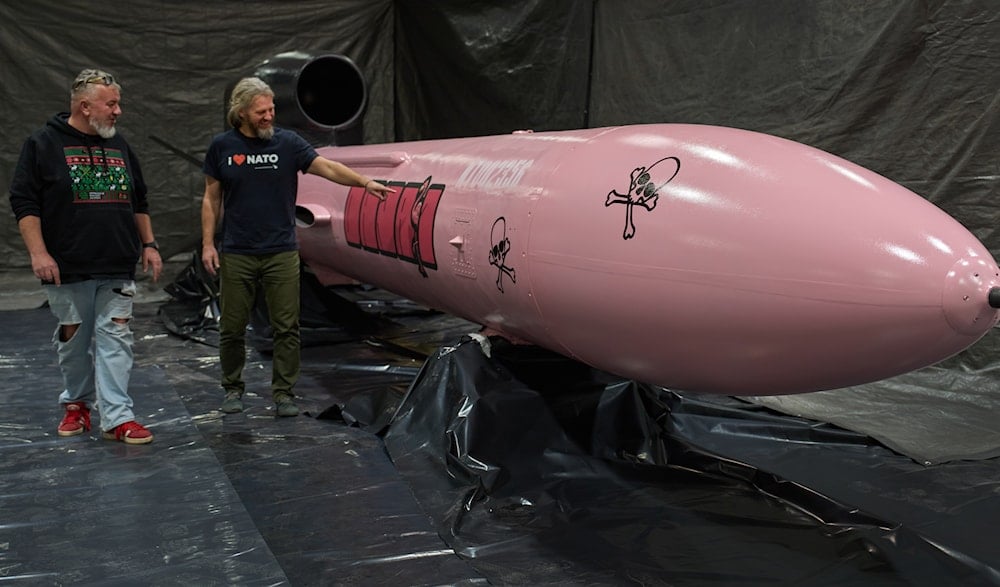Mike Pompeo becomes advisor to scrutinized Ukraine defense company
Former US Secretary of State Mike Pompeo joins Ukraine’s Fire Point as the company expands cruise missile production and faces scrutiny over a corruption investigation tied to defense contracts and ties to a Zelensky associate.
-

Jan Polak, right, and Martin Ondracek from the Czech organization, Weapons to Ukraine, look at a Flamingo cruise missile, which was paid for by their crowdfunding campaign, at the Fire Point factory at an undisclosed location in Ukraine, on November 16, 2025. (AP Photo/Efrem Lukatsky)
Former US Secretary of State Mike Pompeo has joined the advisory board of Fire Point, Ukraine’s leading private defense firm known for developing long-range drones and cruise missiles capable of striking targets inside Russian territory. The announcement comes as the company faces a corruption investigation into its contracts and links to a close associate of Ukrainian President Volodymyr Zelensky.
Fire Point executives confirmed that Pompeo was appointed to its advisory board on November 12. The move is part of a broader effort to bolster the company’s international reputation as it scales up operations, with plans to expand missile production and establish a new manufacturing facility in Denmark. "It’s a big honor for us," said Iryna Terekh, the company’s chief technology officer, adding, "We decided that since we are growing into a big international company, we have to ensure we are following the clearest and best corporate standards."
Terekh also confirmed that three more members would join the advisory board, aimed at providing strategic guidance during the company’s next growth phase.
Fire Point rose to prominence after the war in Ukraine broke out in February 2022, transitioning from an obscure startup to a major arms manufacturer with an estimated $1 billion in revenue this year. The company’s FP-1 drone and Flamingo (FP-5) cruise missile have become critical tools for Ukrainian forces, especially amid shortages of Western-supplied munitions.
The Flamingo missile has reportedly been used in at least four battlefield operations, including a strike on an FSB base in Armiansk, in the Crimean Peninsula, and a recent attack in the Russian city of Oryol.
The missiles are assembled in a classified location inside Ukraine. The Associated Press, granted exclusive access to the facility, described dozens of carbon fiber missile frames scattered across the factory floor, designed to evade Russian radar systems. “We are studying, doing all we can to hit targets as far as we can,” said Maksym, the company’s head of design, who spoke on condition of anonymity. “Right now, we are training, but we are training on objects in the territory of Russia and Crimea.”
Fire Point under investigation over defense contracts
Despite its rapid ascent, Fire Point is under scrutiny from Ukraine’s anti-corruption agencies, which have launched a probe into possible overpricing and inflated quantities in contracts with the Defense Ministry. The investigation also seeks to determine whether the company has links to Tymur Mindich, a business associate of President Zelensky currently implicated in a high-profile corruption case.
Company officials deny any wrongdoing and say the Flamingo missile program is not part of the investigation. They have commissioned a major international audit of the firm’s production and pricing practices to address the accusations. “We completely support the fact that this investigation is happening,” Terekh said. “We will be waiting for the results to come.”
While anti-corruption watchdogs have not yet released findings, lawmakers have questioned Fire Point’s apparent monopoly over deep-strike drones, its quick rise despite being previously unknown, and the opaque nature of its ownership. Though Yehor Skalyha is listed as the legal owner, Fire Point’s founder Denys Shtilerman claims to hold majority ownership, stating that Skalyha owns only 2%.
Shtilerman acknowledged having met Mindich in the past but firmly denied any business ties.
A key part of Fire Point’s expansion strategy includes participation in the so-called Danish model, a system through which foreign governments, including Denmark, directly fund Ukrainian defense manufacturers instead of sending aid in the form of foreign-made weapons.
Fire Point is currently building a new factory in Denmark dedicated to producing solid rocket fuel for its Flamingo missiles. Terekh credited Danish support with helping to resolve bottlenecks in the supply of critical missile components. Meanwhile, public support for Fire Point’s weapons has been strong.
On Sunday, a Flamingo missile, painted with a pink flamingo, was prepared for launch, funded by a Czech crowdfunding group called Weapons to Ukraine. The group raised approximately $500,000 in just two days to finance the missile’s production. “We feel that they are fighting for us,” said Jan Polak, a representative of the group, which previously raised funds to deliver a Black Hawk helicopter to Ukraine’s military intelligence.

 4 Min Read
4 Min Read











